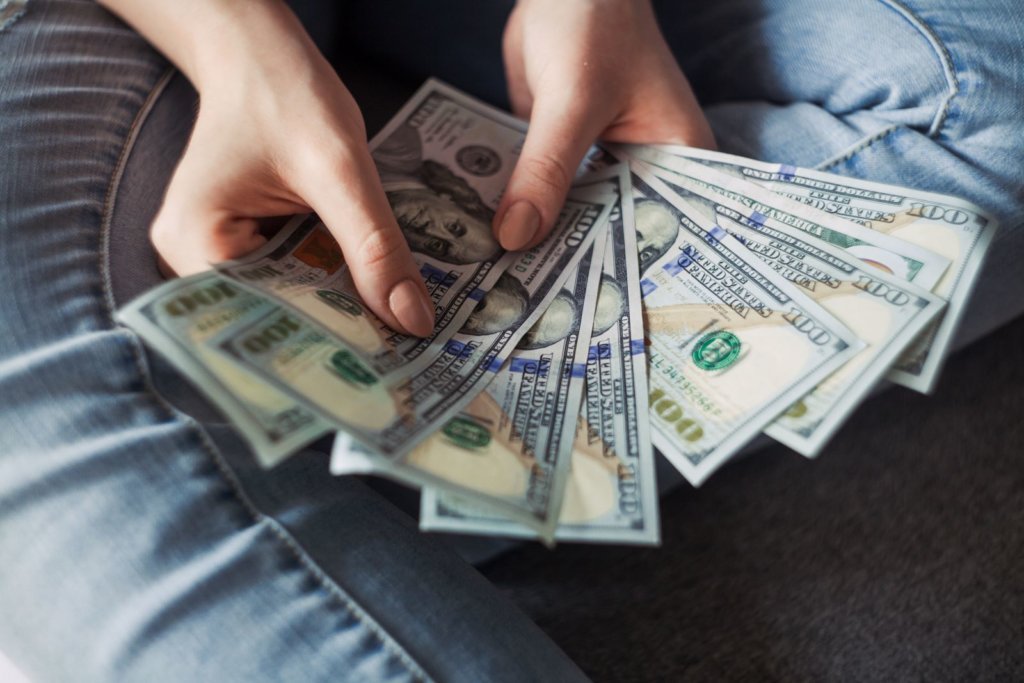It’s been heartbreaking for me to witness the news coming out of western North Carolina. I spent ages 6 to 12 just outside of Marshall and as an adult, many of my friends moved to the area and I’ve visited them. I’ve walked the streets that buckled under pressure from flooding. I’ve shopped at the businesses that no longer exist. Luckily everyone I know is safe but many of the people they know are not. Some families were literally washed away and drowned in a river that rose two stories.
The whole thing is tragic and I’ve cried many tears about it. All of that is true. But what’s also true is that quote from Fred Rogers who said, “When I was a boy and I would see scary things in the news, my mother would say to me, “Look for the helpers. You will always find people who are helping.”
That’s happening in North Carolina. Volunteers are leading mules loaded with supplies into areas impassable by cars. The nonprofit BeLoved Asheville took 40 caravans of essential supplies in one day to areas where it was needed. An organization I’m connected to, Amurtel, is digging out homes, donating supplies, and providing hot meals. And then there are the smaller stories. The ones of neighbors letting people shower at their homes, charge their phones, or store their food because without electricity it will all spoil. There are helpers everywhere.
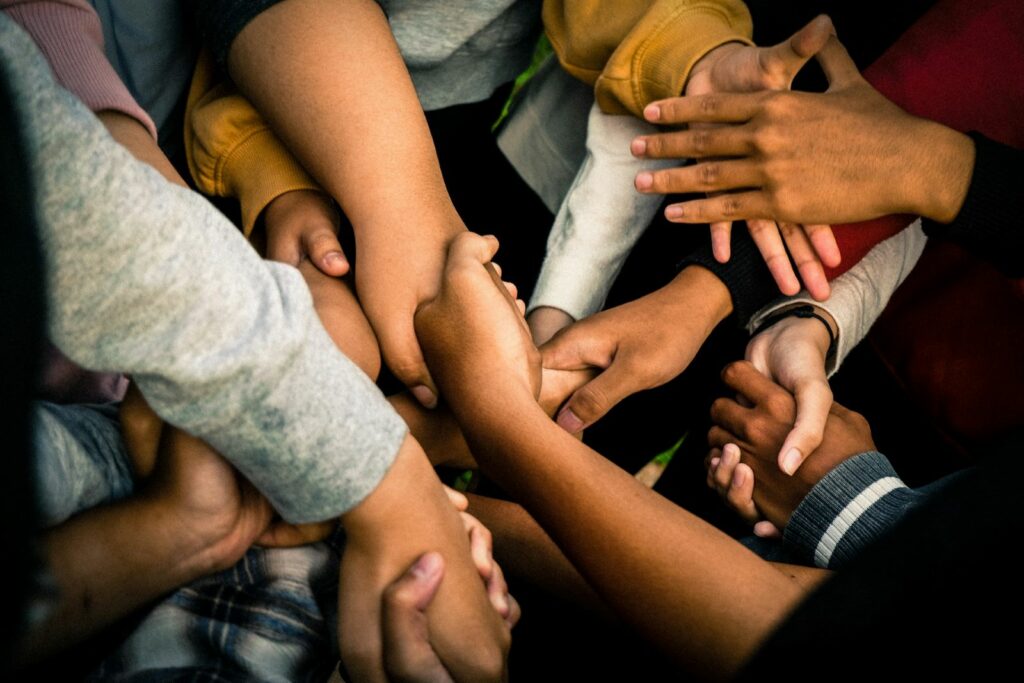
Helpers are everywhere. Photo by Marlis Trio Akbar on Unsplash
I’m getting choked up just thinking about it because it’s so touching. Often a natural disaster brings out the best in people. There’s a true spirit of coming together and helping one another. It reminds me of an African proverb I love that says, “If you want to go fast, go alone. If you want to go far, go together.” Exactly. At times like these, people enact that principle. They understand something my spiritual teacher says:
“One must not forget that collective welfare lies in individuals and individual welfare lies in collectivity. Without ensuring individual comforts through the proper provision of food, light, air, accommodation, and medical treatment, the welfare of the collective body can never be achieved. One will have to promote individual welfare motivated by the spirit of promoting collective welfare.”
Collective welfare is what we’re seeing in North Carolina right now. People who have more are giving to those who have less. Individuals and organizations are focused on meeting people’s basic needs. There are numerous helpers who you’ll likely not hear about on the news but they’re out there if you look for them.
I dream of a world where we hold the complexity of natural disasters. A world where we grieve all that happens while also recognizing the beauty and generosity that can come from them. A world where we understand that collective welfare lies in individuals and individual welfare lies in collectivity. A world where we not only look for the helpers but also become them.
Another world is not only possible, it’s probable.
I’ve loosely been following the Writers Guild of America strike, which has now been joined by the Screen Actors Guild-American Federation of Television and Radio Artists. I feel like I’m watching a dystopian movie but here’s the kicker, it’s all really happening.
The CEO of Disney, Bob Iger, said during an interview at the Sun Valley annual conference, which has been touted as a “summer camp for billionaires,” that he thinks those on strike are “unrealistic.”
“There’s a level of expectation that they have, that is just not realistic,” he told CNBC. “And they are adding to the set of the challenges that this business is already facing that is, quite frankly, very disruptive.” He added that while he respects the right of the unions to “get as much as they possibly can in compensation for their people,” they must “be realistic about the business environment, and what this business can deliver.”
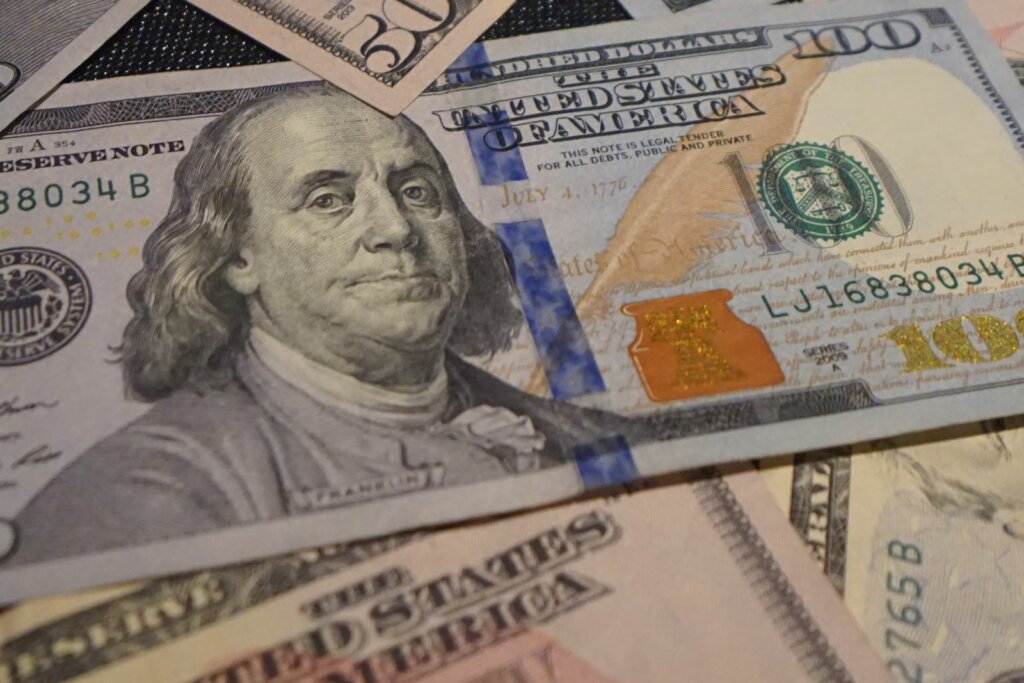
Maybe Bob Iger should be realistic. Photo by Blogging Guide on Unsplash
How about some context? Iger recently took over again at Disney and he has the potential to earn up to $27 million in 2023, his first full year as returned CEO. Let’s break that down a bit further. He is paid $74,175 per day whereas Hollywood writers earn on average $69,510 a year. Abigail Disney, a documentary producer who is also the daughter of Roy E. Disney said in a tweet, “You can only call your workers and partners ‘unrealistic’ if you cannot see beyond the confines of the very narrow and morally bankrupt business ideology that has set your company on this long track toward exploitation and injustice.”
Amen! Actor Sean Gunn had this to say about Iger’s comments: “I think when Bob Iger talks about, ‘What a shame it is,’ he needs to remember that in the 1980s, CEOs like him made 30 times more than what the lowest worker was making. Now Bob Iger makes 400 times what his lowest worker is and I think that’s a f***ing shame, Bob. Maybe you should take a look at yourself in the mirror and ask yourself, ‘Why is that?’ and not only why is that, is it okay? Is it morally okay? Is it ethically okay that you make much more than your lowest worker?”
Apparently, we as a society think it is. Iger isn’t the only CEO to make hundreds of times more than the lowest-paid worker. An article in the Guardian from a year ago found that in the top 300 U.S. companies, the wage gap is 670 to 1. CEOs are making an average of $10.6 million while the median worker is getting $23,968.
I can’t really conceptualize a million because it just sounds like a really big number. To break it down into something more understandable, 1 million seconds is approximately 11 days. How much do you think 1 billion seconds is? It’s more than 31 years. Years. Billionaires can’t possibly spend all the money they have – and you can try using the calculator https://neal.fun/spend/. Billionaires can purchase multiple mansions, make multiple movies, buy multiple yachts, purchase the Mona Lisa, and still have a lot of money left over. A LOT.
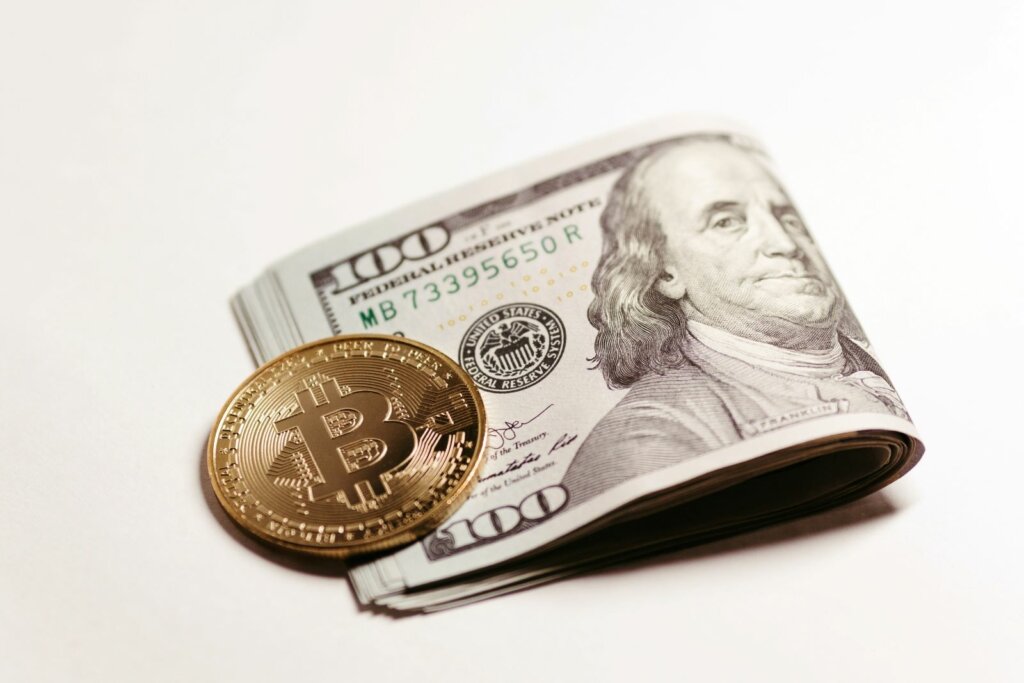
We don’t have to be so inequal. Photo by Jonathan Borba on Unsplash
No one person should have that much wealth and that’s why we need a maximum wage. We have a minimum wage, why don’t we have a maximum on how much one person can earn? I know, I know, everyone in the U.S. thinks they are temporarily embarrassed millionaires so fine, put the cap at a million dollars and make sure the lowest-paid worker is earning more too. In cooperative business models, the wage gap is much smaller. The highest-paid executive at Mondragon Corporation makes six times that of its lowest-paid employee.
Lest you think this is some kind of mom-and-pop operation, Mondragon employs around 80,000 people and its businesses include schools, a large grocery chain, a catering company, 14 technology R&D centers, and a McKinsey-like consulting firm. In 2021, the network brought in more than 11 billion euros in revenue.
You can succeed in business while also being more equitable and Mondragon is an example of that. To bring it back to the writers’ and actors’ strike, what I fear will happen is the studio execs will raise prices for consumers in order to keep lining their greedy pockets. But what I would like to happen is for our country’s artists to say, “No, Bob, you don’t get to make 400 times more than I do,” and then force a maximum wage on him. Stranger things can happen. This is Hollywood we’re talking about after all.
I dream of a world where there’s a cap on wealth. A world where one person isn’t allowed to accumulate billions while others must work multiple jobs just to survive. A world where the highest-paid worker makes no more than 10 times the lowest-paid one. A world where we remember there’s enough for everyone’s need but not enough for everyone’s greed.
Another world is not only possible, it’s probable.
I keep thinking about the swiftness with which Silicon Valley Bank (SVB) collapsed. In the span of 48 hours, it went bust because as interest rates rose, VC capital to SVB’s portfolio companies decreased. That required the companies to start withdrawing deposits from SVB to fund day-to-day business operations but those deposits sat in bonds that were losing value by the day. The need for cash forced the bank to sell their illiquid bonds at a loss, and boom, financial panic.
Whenever I hear stories like these, I strangely have a surge of hope that it portends the fall of capitalism. Don’t get me wrong, I don’t wish financial hardship on anyone. I don’t relish the idea workers won’t get paid or that their retirement accounts will vanish. But I do very much wish corporate capitalism will fall. Big corporations running the show are destroying, well, everything. There’s a place for small-scale capitalism in the form of local shops and restaurants, but these huge conglomerates exacerbating wealth inequality are choking the life out of us.

This picture will make more sense later. Photo by Tzvi Kilov on Unsplash
I had a visceral experience with wealth inequality this week when I went to San Francisco for an appointment. Every 10 feet I either spotted an unhoused person or was solicited by one. It’s overwhelming to be somewhere people are shouting, “Excuse me! Excuse me!” every few feet, and not because they’re hawking goods but because they are in desperate need of something as basic as food.
I cried multiple times when I came home because it’s heartbreaking to witness the evils of capitalism in your face like that and also to know things could be different. The U.S. is the beating heart of capitalism and materialism and visiting Australia reminded me of that. I was abroad for Valentine’s Day and I barely remembered the holiday was occurring because there weren’t hearts displayed in every storefront. There weren’t exhortations to stock up on chocolate and teddy bears whereas here, every holiday is an opportunity to sell something, and the pressure to buy more, more, more is always there.
Is it any wonder SVB execs did what they did? I’m not absolving them of wrongdoing but I am saying we live in a culture where this sort of behavior is encouraged. And yet, SVB did fail and in that collapse, I take heart remembering my spiritual teacher said capitalism will explode like a firecracker, and furthermore, no one will know it’s about to happen even 15 minutes before.
The time element is likely hyperbole but the strong grip capitalism has on our society is not interminable. It can change and it will change because capitalism will collapse under the weight of its own greed. I don’t know what that turning point will be. I don’t know what event will finally cause capitalism to explode like a firecracker, but I know it’s coming. And I also know I welcome that world because I experienced a small taste of it when I was in Australia, which yes, is a capitalist country, but not nearly as materialistic as the good ole U.S. of A.
I dream of a world where capitalism is a faded memory. A world where compassion, kindness, and care for others are valued over greed and amassing as much wealth as possible. A world where in the moments we wonder if that future exists, we remind ourselves it does because as SVB shows us, capitalism will explode like a firecracker and it may happen fast.
Another world is not only possible, it’s probable.
This repost is from almost exactly six years ago but is still relevant today. Enjoy.
I had a dream the other night my sister, Rosie, and I slept in the same bed. She started hogging all the covers and I yanked them back from her and said, “No. You can’t take all the covers.” It’s not a dream based on reality but nonetheless, it got me thinking about greed, especially as it relates to the world’s resources. A group of people is hogging almost all the resources leaving the rest of us shivering in the cold.
Activist Peter Joseph said, “The value system disorder of rewarding, in effect, generally the most ruthless and selfish in our society, both by financial means and then by public adoration and respect, is one of the most pervasive and insidious consequences of the incentive system inherent to the capitalist model.”
I’m with you, Peter. By and large, we as a society seem to be OK with greed as long as it comes from a place of power. No one bats an eye when we hear about corrupt politicians or businessmen engaging in shady backroom deals. In fact, I think we expect it. We’ve become so used to greed and selfishness it seems normal. In a way, it is normal. We all have the same tendencies within us. In yogic philosophy, these tendencies are called vrttis.

Let everyone have a piece of the pie. Photo by Erol Ahmed on Unsplash
My spiritual teacher says, “The correct way to get rid of depraving tendencies is not to repeat to oneself that I shall avoid this tendency or that. Suppression is not the proper way to weaken these tendencies. Do not suppress, but channelize. Humans are psychic beings. Reconvert the psychic into the spiritual. Let elevating tendencies be converted into a spiritual wave.”
My point in using that quote is to say yes, we all have the capacity for cruelness, greed, selfishness, but that doesn’t mean we say, “Oh well. It’s natural. Let it do its thing.” No. As human beings, we are constantly evolving and that means using rationality, it means channelizing our natural propensities toward something else. If I want to strangle a cat, instead of acting on that impulse, it’s better for me to rip up a phone book, or scream into a pillow. The same is true, and can be true, for greed.
I realize not everyone is interested in converting their natural impulses, that’s fine, but it means we as a society have to impose laws and sanctions. We already have consequences for things like murder and theft, why don’t we have consequences for hoarding wealth? Why do we instead encourage it? I already know the answer to that question, but I’d like to go back to my dream.
If Rosie and I were still children living at home, what would happen if we started bickering about the bed covers? Our parents would come in and either make us share or give us separate bed covers. They would come up with a solution – they wouldn’t say, “Oh well. It’s human nature to be greedy Rebekah, get over it. You’ll just have to shiver.”
I’m proposing that we all start acting like parents, coming up with solutions that work for all of us. I’m proposing that we act like adults and say, “No” to people who want to hoard all the covers, so to speak, and instead encourage a fairer share.
I dream of a world where we work together to curb the natural impulse toward greed. A world where we say “No” to hoarding wealth. A world where we understand we can channelize our natural tendencies into something else. A world where we ensure people receive a fair share.
Another world is not only possible, it’s probable.
The other night I dreamt I was stuck with a roommate. For some reason, she couldn’t move out even though I wanted her to. She used my things, threw our house into disarray, and then managed to puncture a large hole in the ceiling. In short, NOT an ideal roommate. When I confronted her about the trouble she caused, she said, “It wasn’t me,” which was a blatant lie. Upon awakening, it seemed to me that dream is an excellent metaphor for what’s happening in the U.S. right now.
The Supreme Court is coming into our house and wreaking havoc left and right. I know not everyone agrees with me – they approve of what the court is doing and think the government should have less power, not more. I hear that. I understand valuing freedom and choice, but here’s the thing – that doesn’t work if people are only focused on themselves.
When you’re motivated by self-interest and greed, you make decisions that only benefit you and not the people around you. That’s a shortsighted way to live because as my spiritual teacher says over and over again, “One must not forget that collective welfare lies in individuals and individual welfare lies in collectivity. Without ensuring individual comforts through the proper provision of food, light, air, accommodation, and medical treatment, the welfare of the collective body can never be achieved. One will have to promote individual welfare motivated by the spirit of promoting collective welfare.”

We are all linked together. Photo by Becca Tapert on Unsplash
We are all linked together but those in power keep refusing to see that. True leadership and a proper, functional government would not prize individual needs over collective needs because they understand what happens to someone else affects them too. Let’s take the company Amazon as an example. Did you know Amazon is burning through its workforce? In a leaked internal memo from June, research stated if the company maintains its status quo, it will run out of U.S. workers by 2024. The turnover rate is astronomical – 150% annually compared with an average of 64.6% in the retail sector, according to the Guardian. Amazon’s founder Jeff Bezos originally welcomed the high turnover because he feared long-term employees would slack off and cause a “march to mediocrity.” But now he’s worried.
Jeff Bezos and his ilk aren’t playing the long game. They aren’t remembering to study the pros and cons of each decision. Nor are they factoring in whether the decision contributes to the welfare of all. If the Supreme Court was doing that, they would understand that allowing states to decide what to do about abortions means some will outlaw it. And outlawing abortions means people with uteruses will resort to extreme measures to abort the fetus.
If the Supreme Court was factoring in the welfare of everyone, they would understand that forcing someone to have a child they do not want is a bad situation for everyone. Setting aside the abortion issue, if the Supreme Court was factoring in the welfare of everyone, they would uphold the ruling that the EPA can enforce gas emissions because hi, climate change really and truly affects everyone not just in the U.S. but around the world. The Supreme Court is not doing that and neither are many politicians.
There is an African proverb that says, “If you want to go fast, go alone. If you want to go far, go together.” We are not going to go far if we keep focusing on ourselves alone. We are not going to solve any of our serious societal problems if we’re thinking, “How can I benefit?” instead of “How can we benefit?” It seems to me we’re getting reminded of that over and over again right now. I hope that as outrage grows, more and more people will wake up to this idea of collective welfare because, wow, do we need it.
I dream of a world where we understand and promote the idea of collective welfare. A world where we recognize that if something doesn’t benefit as many people as possible, it should be rejected. A world where everyone starts thinking of not only themselves but others too because they recognize we are inextricably linked.
Another world is not only possible, it’s probable.
Someone asked me recently, what do I care what Elon Musk does with his money? To start with, why shouldn’t I care? We live in a society that pretends we’re not all connected. That what one person does somehow has no effect on anyone else. Want to own a newspaper company? Sure, go ahead! Build a rocket so you can go to space? Knock yourself out! Won’t make a difference in my life! But it does.
My spiritual teacher says, “The establishment of an ideal society depends on the mutual help of the members and their cooperative behavior.” We don’t have that. Instead, we have a hypercompetitive, rugged individualism mindset that is frankly antisocial. To take a recent example, Elon Musk’s buyout of Twitter is for his own gain. He’s not using money to help solve world hunger like he suggested he might.
In October 2021, David Beasley, the director of the United Nations’ World Food Program, told CNN that it would only take “$6 billion to help 42 million people that are literally going to die.” When the article was shared on Twitter, Musk responded and said he would sell Tesla stock if the program could provide a plan. Beasley did and thus far Elon has not donated. Some people think he still will, but I’m not holding my breath because again, most billionaires use their money for selfish pleasures like going into outer space, buying yachts, and building numerous multimillion-dollar homes. Either that or they use their money to acquire more wealth.
Another reason why I care what billionaires do with their money is it gives them an outsized voice. In the case of Elon Musk, owning Twitter will give him far too much influence on a media platform that has repercussions worldwide. Why should one person have so much power? Plus, when it comes to governance, the opinions of Jeff Bezos, Bill Gates, and Elon Musk far outweigh mine because they can afford high-priced lobbyists and unlimited campaign contributions. If a bill is bad for their business, it’s highly unlikely it will get passed.
Not to mention, the average citizen suffers when wealthy people make mistakes. When the banks failed in 2008, people lost their investments and their homes while bank executives received huge bonuses. We bailed out the banks but the ones who caused the loss of homes and investments became richer, according to Reuters.
What’s the solution here? A maximum wage, for starters, but also changing what we value. Instead of being in a race to acquire as much as we can as fast as we can, yogic philosophy touts aparigraha or non-indulgence. Specifically, not indulging in the amenities and comforts of life that are superfluous for the preservation of physical existence.
In the case of billionaires and their vast accumulation of resources, they’re hurting everyone. Income inequality depresses economic growth, leaves less for society to divvy up, and gives rise to criminal behavior, according to several studies referenced in the Washington Post.
So the short answer to why I mind how billionaires spend their money comes down to this: I care about the collective. My spiritual teacher says, “The collectivity is not outside you – your future is inseparably connected with the collective fortune. You must take the entire collectivity with you and move toward the sweetest radiance of the new crimson dawn, beyond the veil of the darkest night.”
To take the collectivity with us, we have to concern ourselves with what billionaires are doing and furthermore, not let people become billionaires in the first place.
I dream of a world where more people care how billionaires spend their money. A world where we understand our futures are inseparably connected to the futures of others. A world where we take to heart the principle of aparigraha. A world where we move together to create an ideal society.
Another world is not only possible, it’s probable.
As you’ve likely heard, the first-ever Amazon labor union was formed on Friday. What I love about this story is the David versus Goliath aspect. I can think of no better representation of a modern-day Goliath than Amazon. After all, Amazon accounts for more than 40% of ecommerce, according to emarketer.com. The next highest percentage of internet commerce is Walmart, coming in at 7.1%. So. There’s that.
And, regarding workers specifically, Jeff Bezos said in a New York Times article he didn’t want hourly workers to stick around for long because he viewed a large, disgruntled workforce as a threat. That attitude shows because the company spent $4.3 million in 2021 alone on anti-union consultants, according to U.S. Department of Labor filings. And maybe you’re saying, “Amazon doesn’t need a labor union because employees have great working conditions!” That’s what Amazon is touting, but the reality doesn’t match because Amazon measures the time each employee spends off task at its warehouses, meaning every bathroom break is accounted for. If a person spends too long in the bathroom, they can be and have been, fired.
I could keep going, but I already wrote about the poor working conditions in a blogpost last year. Instead, let’s talk about our David, Christian Smalls. First off, how perfect is that last name to represent David?!? Also, he’s someone Amazon discounted because, in a leaked memo obtained by Vice in 2020, an Amazon layer told Jeff Bezos that Smalls was “not smart, or articulate.”

Keeping it classic here with the David sculpture. Photo by Mateus Campos Felipe on Unsplash
Take that, Amazon! The man you viewed as not smart or articulate spent the last two years talking to workers on Staten Island, holding cookouts, conversing with them at bus stops, and educating them on why a labor union is necessary. And it worked. Despite previous failed attempts, the Amazon factory known as JFK8 has a labor union. The vote wasn’t close either – the “yeses” outnumbered the “no’s,” by 500 votes. Yes, Amazon is fighting the outcome because of course they are, but still. In this day and age when we hear so many stories about corruption, plutocracy, and big corporations doing terrible things despite the opposition of the general public, it’s nice to hear a story about how the little guy can still win.
It reminds me of a quote from my spiritual teacher who spoke a lot about dharma, or the essential characteristics of human beings. There’s a lot to say on the subject, but in brief, my spiritual teacher praises the higher qualities of human beings; the ones that are aligned with truth, justice, generosity, and compassion. He said whenever human beings follow these higher qualities, their well-being, victory, and prosperity are ensured.
Furthermore, “whoever goes against these ingrained human characteristics … will be doomed to destruction. By divine decree, everyone has the right to live in the world with dignity. If anyone creates any obstacle against this dharma-oriented system, if they oppose it, they are bound to be destroyed. No one has ever been victorious or will ever be victorious by opposing dharma. Always remember that when dharma is with you, whoever will oppose you will be razed to the ground – their destruction is a must.”
A caveat here is sometimes that destruction is slow. It can take decades to appear and/or may happen in another life. However, I take heart knowing that in the long run, the righteous, the justice-oriented, the person who is fighting for a better world, like Christian Smalls, in this case, will win.
I dream of a world where we remember real-life David versus Goliath stories exist. A world where we understand sometimes the little guy does trounce the evil, big conglomerate. A world where we realize if we continue to do good in the world, to follow our higher nature, eventually we will succeed.
Another world is not only possible, it’s probable.
This week I read a Twitter thread about the creator of the latest Netflix phenomenon “Squid Game.” According to several news pieces, Hwang Dong-hyuk wrote the show in 2009 but was rejected by studios for 10 years. He once had to stop writing the script and sell his $675 laptop because of money struggles. The Twitter thread author, Ifę, @ifetalksback, said as a writer they find the story terrifying more than inspiring.
As part of the thread, Ifę said, “They’ll be like ‘I had to wait 15 years, my mother don’t speak to me anymore, I lost a finger to typing so much, I can’t remember the last time I saw the sky. But now I have a show,’ And the comments from everyone who ISN’T a writer is like ‘NEVER give up bro, so inspiring.’”
I agree – on the one hand, it’s always inspiring when long-awaited dreams come true, but on the other hand, I find the story to reflect poorly on not only the film industry, but also us as a society in general. Hwang had to literally sell one of the tools of his trade in order to make ends meet. That’s not OK.
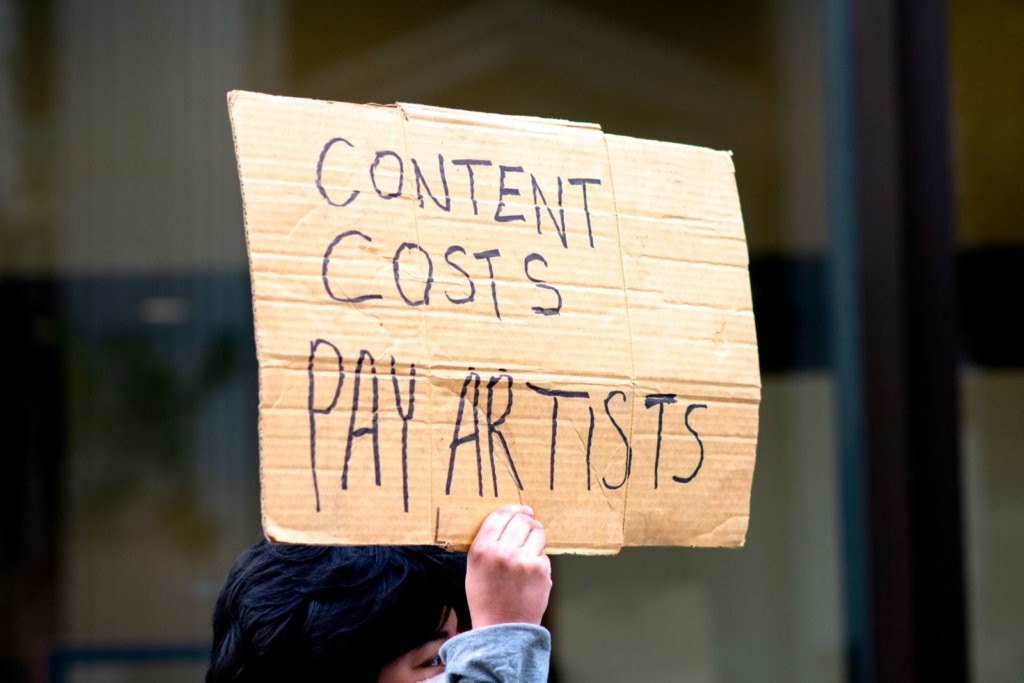
The picture says it all. Photo by Patrick Perkins on Unsplash
My spiritual teacher says it’s the duty of society to support its artists because artists are pioneers. “If those who are the pioneers of society … if they are forced to starve or half-starve, this will certainly not be to the credit of human society. It is unthinkable that these creative geniuses should curse their own fate.”
Seriously. Artists – and that includes writers – have a special role to play in society and letting them struggle is not cute or inspiring or romantic or whatever notions we have in this modern world. It’s a travesty. Especially during the pandemic, we’ve seen the importance of art and literature. What would we do, how would we survive if we didn’t have books to read, movies to watch, games to play? For many, escaping into entertainment was, or is, the only way to feel joy during an otherwise extremely bleak period. And yet we let artists like Hwang Dong-hyuk toil away and then romanticize his rags-to-riches story? No.
What would happen if artists were supported and didn’t need to work “day jobs” or have numerous “side hustles” or live with 10 roommates just to survive? What sort of art would they make? What would they be able to accomplish if they weren’t constantly worried about money? In case you can’t tell, I’m PISSED this is the situation we find ourselves in. Not only for artists, but for everyone.
Who does this capitalistic, hypercompetitive economy work for? Very few, that’s who. And the reality is we don’t have to live like this. I don’t know how we release ourselves from the shackles of capitalism, but I do know there are other ways to live. Ways in which people are guaranteed the basic necessities of life like food, clothing, education, shelter, and medical care. Ways in which people are valued over profits, the environment is respected, and we as a society are able to satisfy our higher intellectual, artistic, and spiritual aspirations. Ways in which artists like Hwang Dong-hyuk don’t have to sell their laptops in order to pay their bills.
I dream of a world where we not only praise artists and writers, but we value them with our wallets. A world where we support artists and writers so they can do what they were put on this Earth to do – create. A world where we understand artists barely making ends meet is appalling, not romantic.
Another world is not only possible, it’s probable.
P.S. This might be a good time to mention I have a Patreon campaign. If you value my work, consider contributing.
This weekend a friend told me his friends are getting into cryptocurrency so they can make a lot of money. My response was, “So they can do what? Retire early and satisfy every pleasure they have? Or build a rocket ship into space while there are people literally starving to death?”
I mean, I understand the impulse. Our society lauds the accumulation of wealth. When Jeff Bezos launched into space, morning shows allocated 212 minutes to discussing it. In contrast, they spent 267 minutes for all of 2020 discussing the climate crisis even though the climate crisis is a far bigger story that impacts the entire world. In the U.S. anyway, we treat money like it’s the most important thing, as if being wealthy is the greatest accomplishment of a person’s life. We see this not only in media coverage, but also in how wealthy people are allowed to become richer. We aren’t taxing the rich to fund things like schools, roads, bridges, healthcare, or anything that would benefit the many. No. Instead we’re letting people accumulate wealth unchecked so they can visit space for 10 minutes on the backs of people who are working in inhumane conditions.
I’m not someone who thinks money is the root of all evil. I don’t think we should go back to a time of bartering for all our needs. Money makes life more comfortable, absolutely, and being poor is one of the hardest, most stressful situations a person can find themselves in. But why are some people allowed to make millions in one day while others are working multiple jobs just to cover all their expenses? And furthermore, what’s the point of making so much money you can buy a private island?
My spiritual teacher says:
“A mind, driven by many psychic [desires] is the prisoner of innumerable predicaments. In such a condition, the human mind becomes extroversial, multi-directional, weak, and static. It is propelled by the principle of selfish pleasure, which leads it down the path of counter-evolution. … As people have to satisfy their unrestrained psychic [desires] with limited objects of wealth, they often create interpersonal and inter-group conflicts. The collective psychology arising from many objectified human minds gives rise to social inequality, economic exploitation, political repression, religious bigotry, cultural perversion, and the all-round degradation of the individual and society. Crude psychic [desires] cause the degeneration of individual and collective mind, and thus bring about the downfall of the society.”
I’d say we’re seeing that now. Society certainly seems to be moving in a downward direction in many regards. So what’s the point of life if it’s not to get as much wealth as possible and satisfy every selfish pleasure that enters your brain? Take it from someone who is rich and famous, Jim Carrey, who said, “I hope everybody could get rich and famous and will have everything they ever dreamed of, so they will know that it’s not the answer.”
The answer instead is to eradicate all inequalities and contribute to society in such a way that we’re supporting each other, taking care of each other. The answer is to live in this world, to ensure everyone has their basic needs met, but also recognize there’s more to being alive than material gain. Ultimately what we’re seeking is infinite pleasure, infinite happiness, and that only comes from something that is also infinite: communing with the loving consciousness that pervades this universe.
I dream of a world where we understand despite what much of society tells us, the point of life is not to get rich and famous. A world where we realize satisfying every selfish pleasure only leads to our downfall and the downfall of society. A world where we appreciate material goods, but also recognize ultimately life is more enjoyable if we serve society and commune with spirit.
Another world is not only possible, it’s probable.
June 21 and 22 are Amazon Prime days so I wanted to take a minute to talk about the reality of this company and capitalism in general.
Earlier this month, the New York Times came out with an article titled “The Amazon Customers Don’t See.” It’s quite long so I won’t detail the intricacies of the article but instead highlight a few aspects. First off, Amazon measures the time each employee spends off task at its warehouses, meaning every bathroom break is accounted for. If a person spends too long in the bathroom, they can be, and have been, fired.
One employee wrote on the internal feedback board, “It is very important that area managers understand that associates are more than just numbers. We are human beings. We are not tools used to make their daily/weekly goals and rates.”
However, Amazon warehouse employees are not treated like human beings, which is reflected in the company’s turnover rates. From July to October 2020 alone, Amazon hired 350,000 new workers, which is more than the population of St. Louis. Many recruits were hired through computer screening with little conversation or vetting. They only lasted a few days or weeks. Amazon’s turnover rate is roughly 150% a year, which is almost double that of the retail and logistics industries, according to the Times.

I urge you not to support this company. Photo by Christian Wiediger on Unsplash
Some more numbers for you: In 2019, the company hired more than 770,000 hourly workers, even though Amazon, including corporate staff, grew by just 150,000 that year. That means the equivalent of Amazon’s entire work force, roughly 650,000 people at the start of the year, left and were replaced that year. If Amazon is churning through its entire work force once or twice a year, it would need to have eight, nine, 10 million people apply each year, which is about 5% of the entire American work force. Five percent of the ENTIRE American work force.
The high turnover is built in to Amazon’s bones as Jeff Bezos said he didn’t want hourly workers to stick around for long because he viewed a large, disgruntled work force as a threat. Yeah, because then they might start asking for stuff like higher pay. . .
Also, let’s talk about racism. Black associates were almost 50% more likely to be fired than their White peers. In Amazon’s warehouse, more than 60% are Black or Latino whereas more than 70% of managers are White or Asian. So not only is Amazon burning through workers, it’s also perpetuating racism within its ranks.
Amazon is a prime (ha!) example of capitalism at its worst. Not only is Amazon exploitative, it plays to the worst part of our humanity – our desire for convenience no matter the cost. Bezos said people are inherently lazy and our nature as humans is to expend as little energy as possible to get what we want or need. He’s right, which is why Amazon sales exploded during the pandemic and the company continues to grow.
But again, I ask, what price are we paying for this convenience? We’re destroying the planet and treating people like machines. We’re supporting a company that appeals to our basest instincts and perpetuates what many are so actively fighting to change, i.e., racism. If you care about small businesses, workers’ rights, human rights, or the planet, you cannot actively support Amazon. And look, I know there are some products only Amazon sells – a “perfect” boycott is likely unachievable, but can you buy less from them? Even a little less? I know it’s inconvenient, but perhaps the price is worth it.
I dream of a world where we support our fellow human beings. A world where we demand people are treated with the respect and care they deserve. A world where we put our money where our mouths are when it comes to our values. A world where we understand sometimes the price of convenience is too high to pay.
Another world is not only possible, it’s probable.
